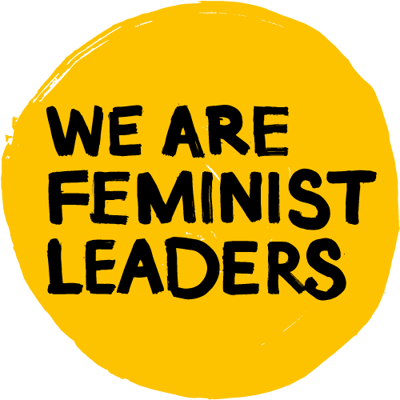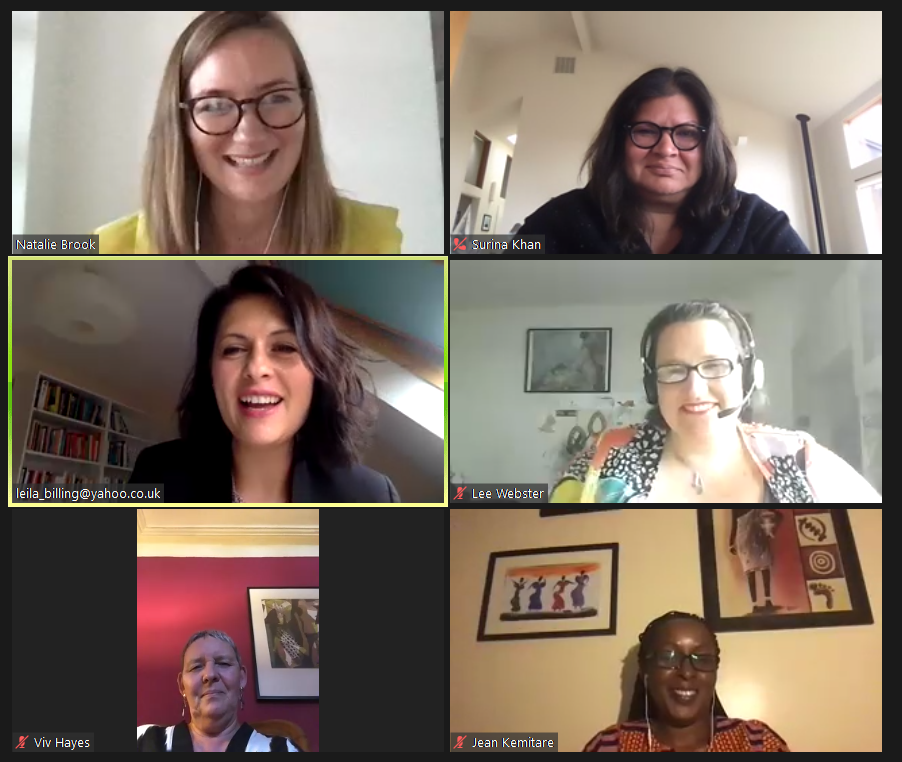
Why you should implement Feminist Principles in your organisation...
How would you define the word 'feminist'? It's a term that has been around for decades but often has outdated connotations.
As part of our International Women's Day podcast mini-series we welcome Natalie Brook, Co-Founder of We Are Feminist Leaders, a brand new initiative designed for emerging leaders (working in any sector) who would like to lead in a radically different way.
Natalie started her career in campaigning for NUS and Oxfam. It was whilst working for Oxfam that she became a helpline volunteer for Oxfordshire Sexual Abuse and Rape Crisis Centre, which led to her managing the centre. Since then she has been a passionate supporter of women's sector organisations, working as an independent consultant as well as co-founding WAFL in 2020.
Welcome, Natalie! It’s so brilliant to have a fellow Brightonian join us on the podcast. First things first, how did you come to find yourself in our wonderful city, and how are you spending your days in this strange lockdown period?
I grew up just outside of Brighton, and I left Sussex when I was 18 to go to university but came back about five years ago - it was always a bit of a dream to come back to the city and be by the sea! Lockdown is a very strange time and alongside the rest of the UK, I'm a bit bored! I'm a bit of a sea swimmer so I've been doing that through the winter to keep my spirits up.
Your new initiative is named ‘We are Feminist Leaders’. What is your definition of a Feminist Leader?
We talk about feminist leadership as something that is about applying feminist principles to the way that we lead so that we can achieve social justice aims, and that that enables everyone to thrive at work. So for us, that's about the positive and inclusive use of power. Feminist leadership really is all about examining how power operates within an organisation. By doing that you are building an organisation that's really capable of changing the world. It is also about subverting what we would normally see as traditional masculine notions of leadership so that we can change the way power is exercised. To achieve this we talk a lot about the need for reflection, continuous learning and being really being mindful of the power that we hold as individuals. Importantly, feminist leadership is something that can be practised by anyone, no matter who they are.

Is this way of working something that you were doing before in your consultancy role before starting We Are Feminists Leaders, or is this something that has grown from your previous experiences?
My background is in working on gender and women's rights projects which began through volunteering in a rape crisis centre, many moons ago. This formed a huge part of my own development and understanding of what feminism meant to me, and what it could mean more broadly. Working in a feminist way and using feminist principles in my career has been part of my work for a long time, both within the organisations that I've been part of and since I've worked independently as a consultant. But our new project and course is really sort of a combination of of that work and some frustrations which led to this new idea being born.
If an organisation is interested in becoming more open to the principles of feminist leadership, what are the first steps they could take?
Firstly, think carefully about about what you're hoping to achieve. Why is talking about feminism and feminist leadership principles important to you? What are you hoping to get out of it? The thing about feminist leadership that I think is quite different from other forms of leadership is that it is not a tick box exercise that you can run through, say you've achieved x, y, and z and ta-da! you are a x, y, z type of leader. It's a much more intensive journey that really requires a lot of introspection and analysis of how your organisation works. So knowing what you want to achieve from the outset is really important.
I'd advise looking at your existing organisational values (if you have them) and think about whether they they do align with feminist values. If they don't, perhaps it's not a good fit for you. But if they do, maybe feminist leadership is something that could really help you embed and live your values. So starting to explore how relevant some of those values and principles are. I've mentioned concepts like power sharing, but accountability is also important. What does accountability genuinely look like in your organisation, both for individuals and for groups of people in the organisation? Things like collaboration and building alliances, and also building cultures of care.
How you look after your staff and how staff are encouraged to look after each other are really central principles. So if that chimes with what you're trying to achieve already and you're really willing to look quite deep into the structures and culture of your organisation and commit to making change, I think feminist leadership could be something that you would find useful.
You’ve spoken before about the difference between feminine leadership and feminist leadership and the representation of women in leadership. Can you explain a little more around these topics?
Often, when I talk about feminist leadership people will respond to me and say, 'Yeah, great, we really want to get more women into leadership roles', which is completely understandable because feminism is often associated with women's rights and the representation of women in public spaces.
Often what we're really talking about when we speak about feminist leadership is that that while it is crucially important to get women into boardrooms and management positions to progress gender equality, feminist leadership as a concept is about a lot more than just recruiting more women into leadership positions.
Feminist leadership is a much more political approach and women's leadership - what I just described is something different. It's basically women as leaders. And what we know is that there are many examples of when women get into leadership positions they don't necessarily have the capacity, the power, the access to decision making that enables them to lead in a different way. So actually, getting women into leadership roles doesn't always achieve what we hope it will do because the context around them hasn't shifted.
We do separately want to really recognise and acknowledge the value and the attributes that women bring into leadership. There are lots of things that are unique to women that bring value into leadership roles. But getting women into leadership is only one way that real change happens. What we talk about is doing things like assessing what happens once women are at the table. Do they have an equal voice? Do they have capacity to make decisions and to use power equally? Importantly, is every woman able to do those things equally. For example, are minoritized women such as black or disabled women able to use power In the same way as a white woman? If you're not able to analyse these distinctions, then again, it's a bit of a sticking plaster but it's not achieving real change.
You’ve recently launched a (now sold out!) 12-week course through We Are Feminist Leaders to guide individuals to become stronger feminist leaders. Can you explain how this came about and who the course is aimed at?
We talk about our target audience as emerging leaders. People who might be in the early stages of their career or starting to think about leadership and management roles, or even might even have those roles and want to consider how leadership might look a bit different for them.
Lots of people kind of enter the workplace within a hierarchical structure where a type of leadership is pretty set. What we hope to do with the course is provide an opportunity to reflect on on what that leadership culture is in your organisation and whether or not you might want to do things a little bit differently later.
My Co-Founder, Leila and I actually met on a leadership development programme a few years ago. That's what prompted the development of We Are Feminist Leaders because we were really disappointed that the leadership models that we were being taught didn't have any sort of power analysis. They didn't talk about what power is and what opportunities there are to use power really positively. We often talk about power or something that isn't always that positive. So you know, abuse of power, especially in my world of working in gender based violence, power dynamics and we're seeking ways to dismantle structures of power, often in abusive situations. So what we wanted was to have an opportunity to look at leadership through a feminist lens and through discussions about what power means but we couldn't find it anywhere. So we decided to do it ourselves. And that's how this programme came about.

Natalie and Leila doing their thing on Zoom!
One of the principles you cover in your course is how to build cultures of care, starting from the principle of self-care for leaders. How can people develop this in their company?
Firstly, it's important to develop a meaningful culture. Self-care has become commercialised and commodified, which inevitably lends itself to a very individualistic view towards it - ie. something an individual is responsible for. But it’s meaningless if a company doesn’t understand what self care is and supports staff to engage in it, as it will always be seen as a ‘nice to have’ rather than a critical part of the business.
Self care is often seen as something that we can buy. The notion that we have to spend money on green juice and yoga to look after ourselves! This then not only places it in this really interesting position of being seen as only accessible by a privileged group of people that can afford to 'do self care', but it also lends itself to a very individualistic view towards it. So by saying you should be caring for yourself, what it means is that a company is kind of off the hook a little bit with their staff. It becomes a bit meaningless if companies don't really understand what self care means and why it's needed as a really critical part of their business; as something that will improve staff retention, improve performance and attract the right type of staff. It's not just a nice to have, which I think is is often seen as so we talk about self care, as well as cultures of care.
We want to move slightly away from that individualistic view and responsibility towards self care towards to something that we all collectively within an organisation are responsible for and that the organisation itself invests in a way that really means something rather than as in a tokenistic way. We believe that self care and cultures of care is really vital to feminist leadership. If we as feminists and leaders (if you're defining yourself as a feminist leader) don't understand our own needs and take care of them and how to take care of them, how can we possibly continue the hard work of social change? If we're trying to make a positive change in the world we need to be really resilient in the face of those things. So we need to ensure that we're looking after ourselves and our colleagues to be able to continue doing that work long term.
As leaders, we have a responsibility to build those cultures and promote care both of ourselves by setting an example and to each other so that we can promote well being. We're all in such different working circumstances, increasingly isolated by working from home where our work and home lives have bled into one huge mass. We're surrounded by carrying responsibilities with children being homeschooled or other caring responsibilities. So now is a more critical time than ever to really look at how your organisation is responding to that and making sure that staff are well cared for.
Perhaps it's implementing an organisation policy of 80% working hours where you don't need to explain yourself - everyone is expected to work 80% of their waking hours and if you work more brilliant, if you don't, that's fine too. That brings with it like lots of questions around trust and things like that. But I think it can also send a really clear message to staff that they are trusted and it's acknowledged that they're working under difficult circumstances.
Companies could invest in specific well being activities or just provide spaces to talk about well being and how everyone's doing in a way that isn't just an item at the end of an agenda - there needs be dedicated spaces to talk about it.
I've seen examples of staff being given an extra amount in their paycheck every month to spend on a well being activity, whatever that might be, again, this aligns with the trust element because you're giving people the choice to invest in something that's appropriate to their needs, not necessarily something that your Chief Exec thinks is appropriate. And just acknowledging I think that we're facing really difficult times and being really open about that - not expecting that we're going to be able to continue on as business as usual.
If someone listening feels like their organisation could benefit from adopting feminist leadership principles in the workplace, how could they encourage senior management to invest in a course like yours?
So I think it's about an organisation understanding if and what the benefits for them could be. And they could be huge. So I've talked a little bit about some of the things that we we discussed on the course that really helped staff and organisations think about how their team how their organisation can be more inclusive. So we're addressing those power dynamics, talking about things like intersectionality - a concept which helps define how people who might experience multiple forms of oppression can be supported.
So it's not just about thinking how do people or staff who are disabled need to be supported? Or how do people who are from black or minoritized communities need to be supported? It's talking about those things as well as and what about the black disabled women in our in our workforce - how is she represented and what space does she have to have her voice heard? Those are things that can really transform the way that you look at your workforce and include the people in it. I talked before about the values of an organisation, so making an organisation more values driven and really living those values. Some of us in organisations have developed value statements - they're all up on the wall or on the website, but not often referred to.
What we do is help organisations think through what they mean in practice about retaining and attracting a more diverse and high quality workforce. Finally, for those organisations that are trying to make a social and positive change in the world, I think feminist leadership practice can help you really live and breathe the change you're trying to make. We do recognise it's not for everyone, but I think for any business that wants to make a positive impact in the world it's a no brainer.

Finally, we’d love to know which leaders inspire you and why!
There's loads! One is an Indian woman called Srilatha Batliwala. She is a huge thinker on feminist leadership and academic, if you're interested in getting into the detail of feminist leadership I do really encourage you to look her up. Secondly, it would be all women who've worked in the UK women sector. So by that I mean the refuges, the domestic abuse organisations which have been running for five decades and the women who have set up charities in the 70s from their back rooms.
Finally, I was thinking about who right now has been responding to COVID with strong leadership. I don't agree with everything she says, by any means but Nicola Sturgeon I think has shown some real feminist leadership through the compassionate way that she's communicated to the Scottish people and the world about COVID - a really stark contrast in my opinion to how our leaders in Westminster have spoken about it. And you know, I think it's quite shocking that it took until February for our Prime Minister to directly address parents - 10 months after it started. I think other leaders have been much more compassionate and careful about the way they've communicated about that.
A BIG thank you to Natalie for joining us on the podcast and uncovering the benefits of introducing feminist leadership principles in the workplace. You can connect with Natalie on LinkedIn or check out more about We Are Feminist Leaders and their upcoming programmes on their brand new website and on Twitter.
Our podcasts are recorded and produced by Let's Talk Video Production.

